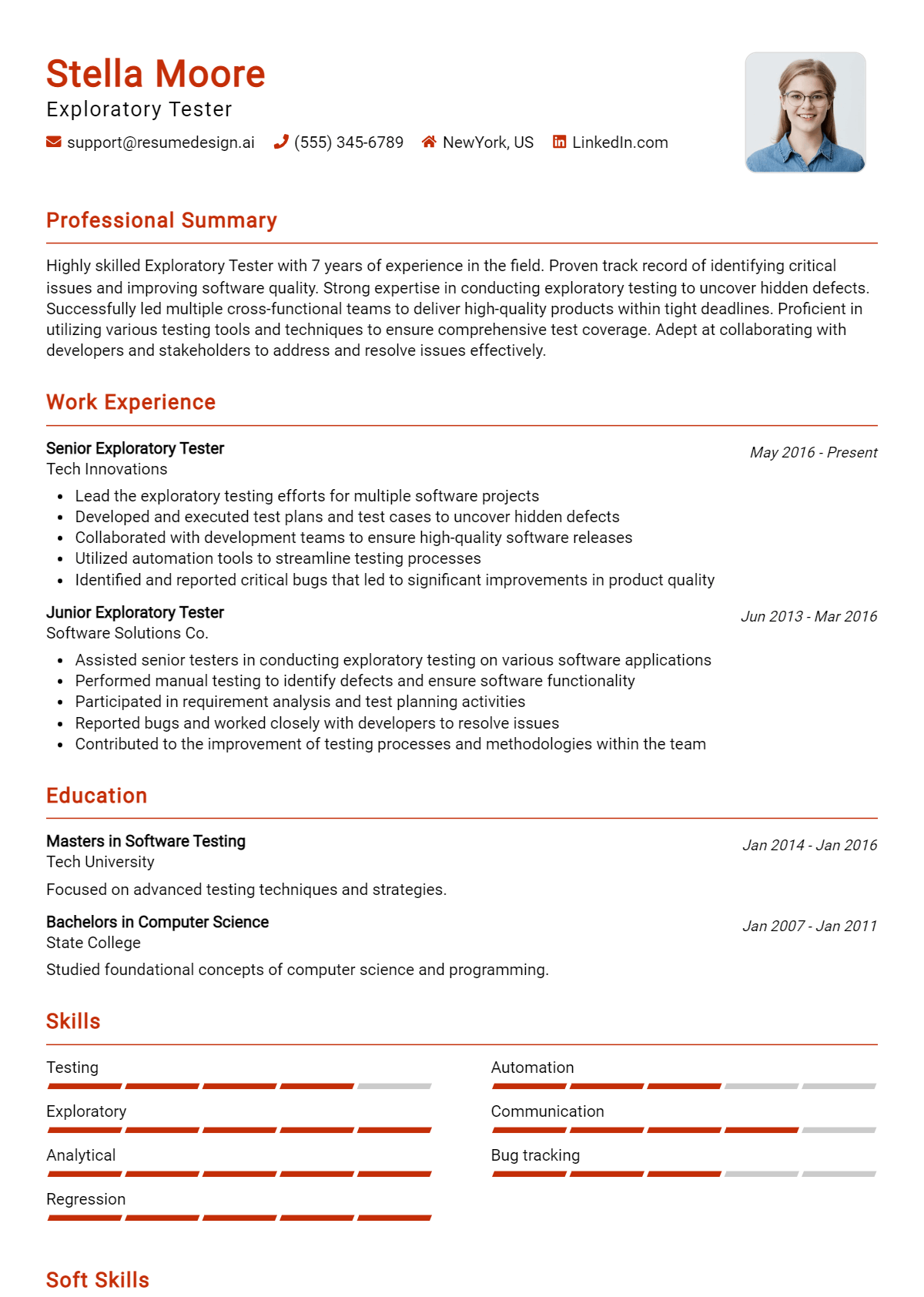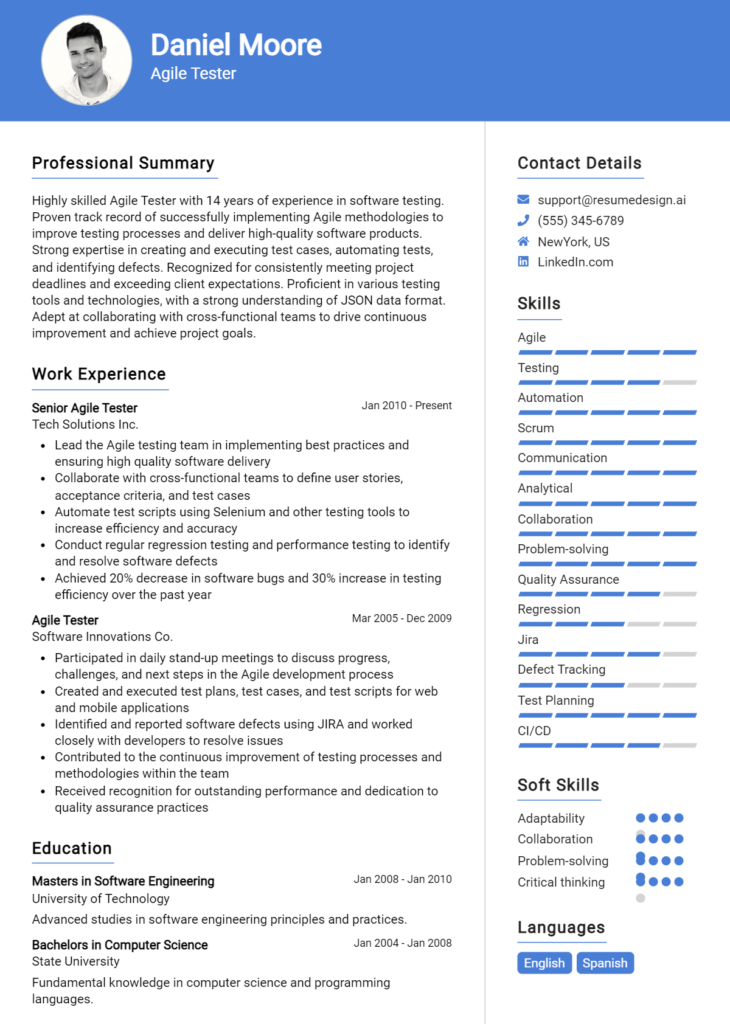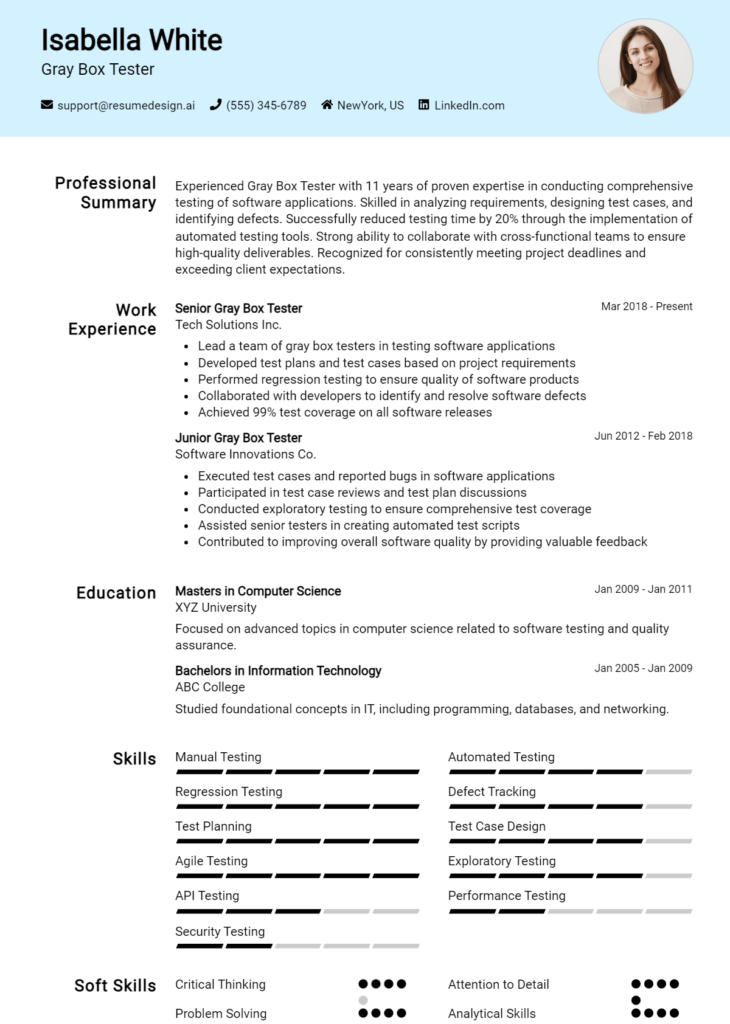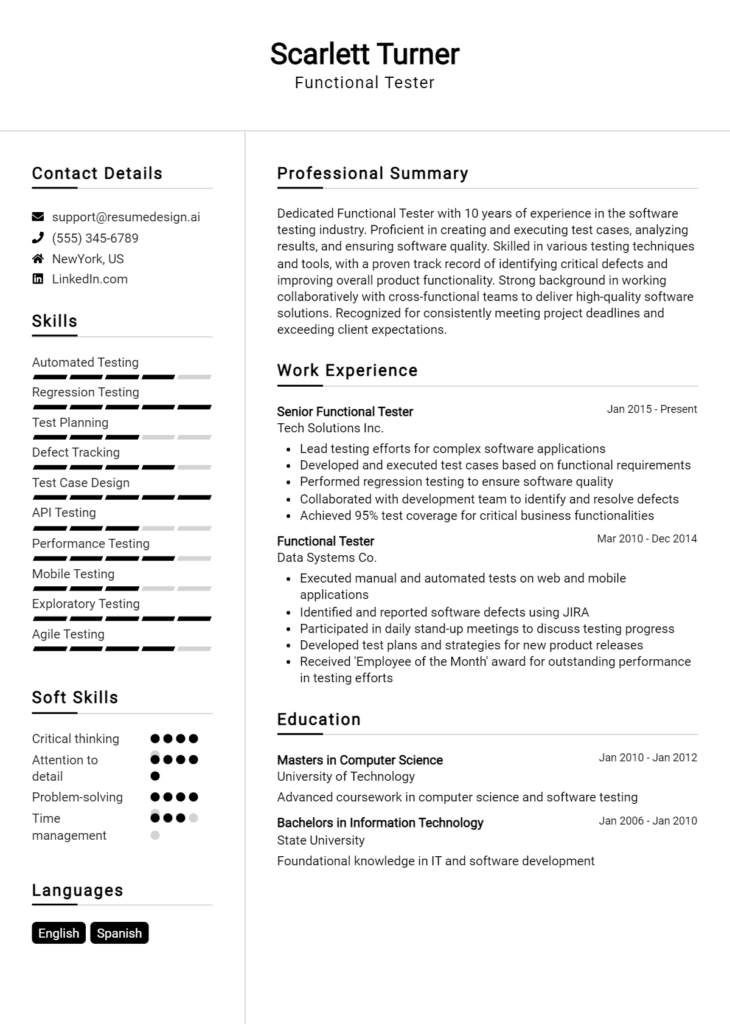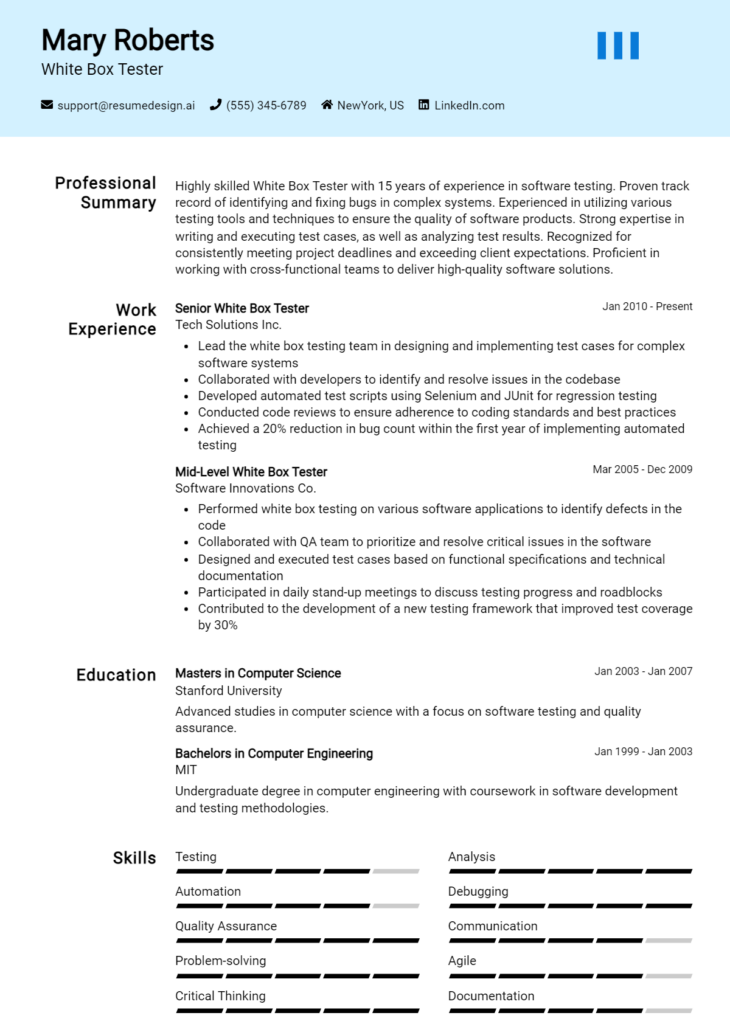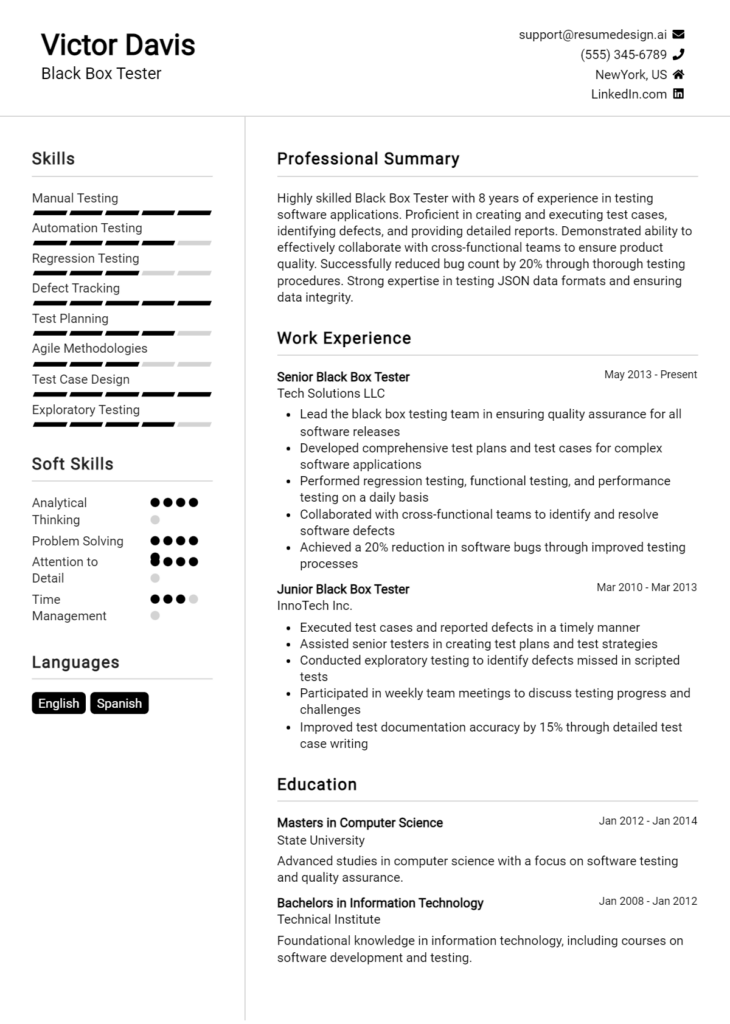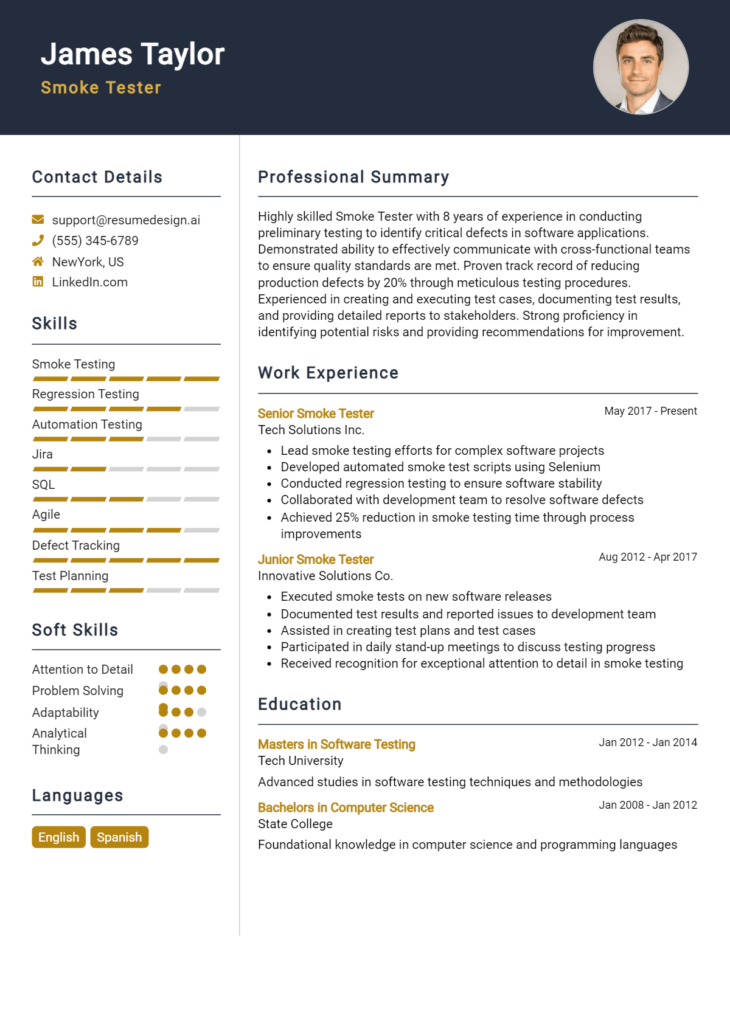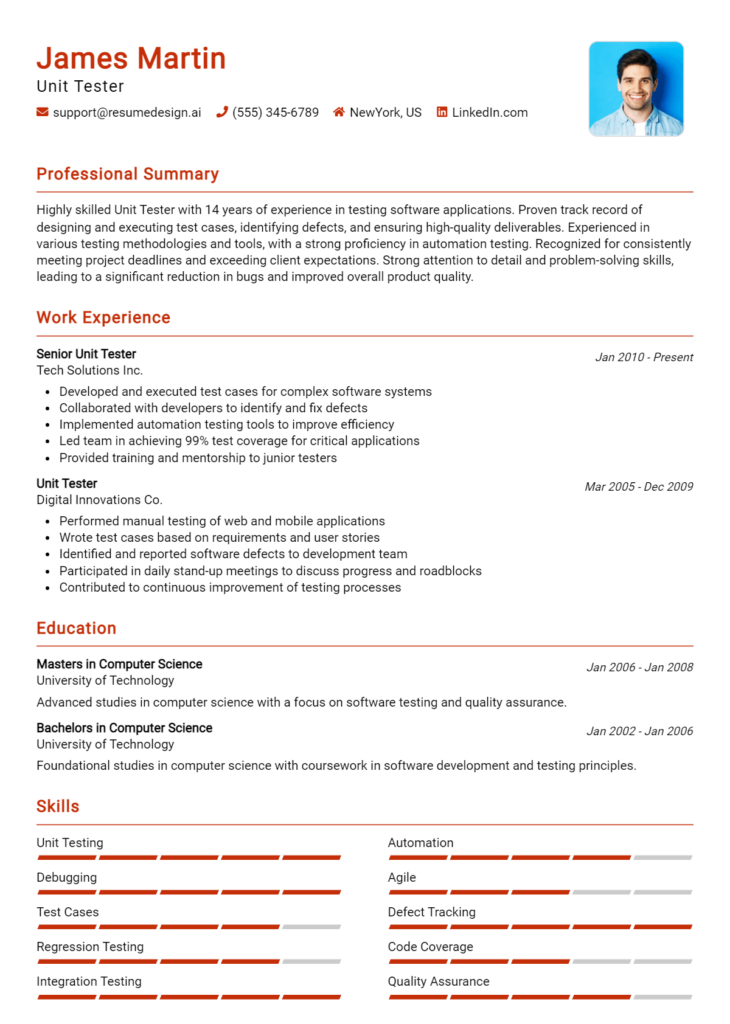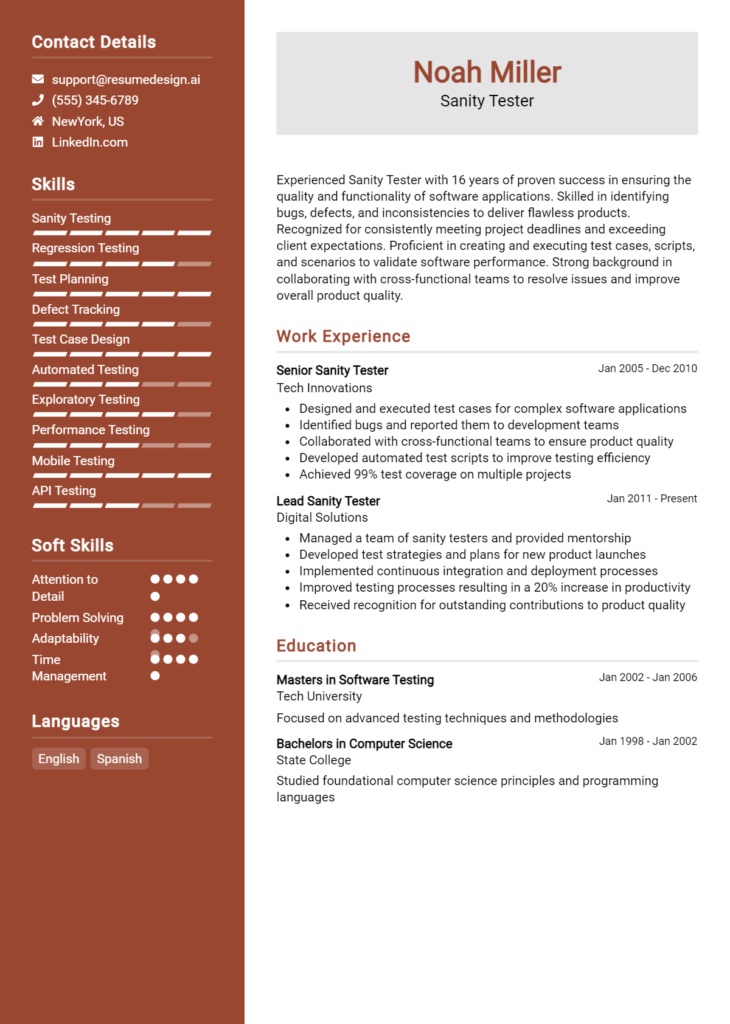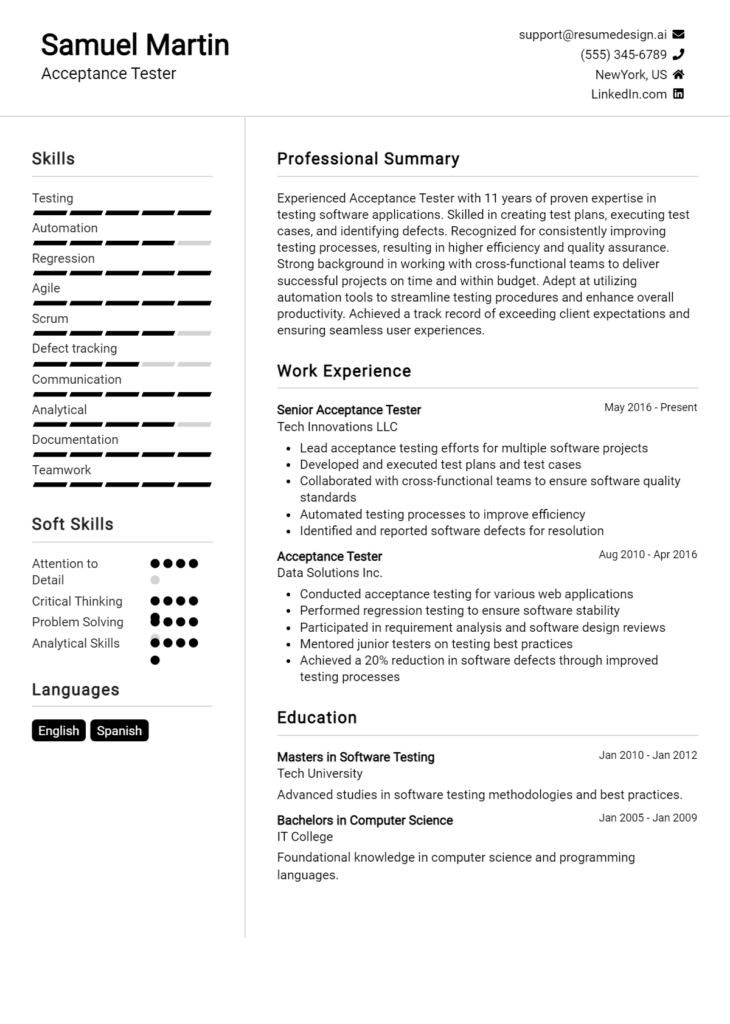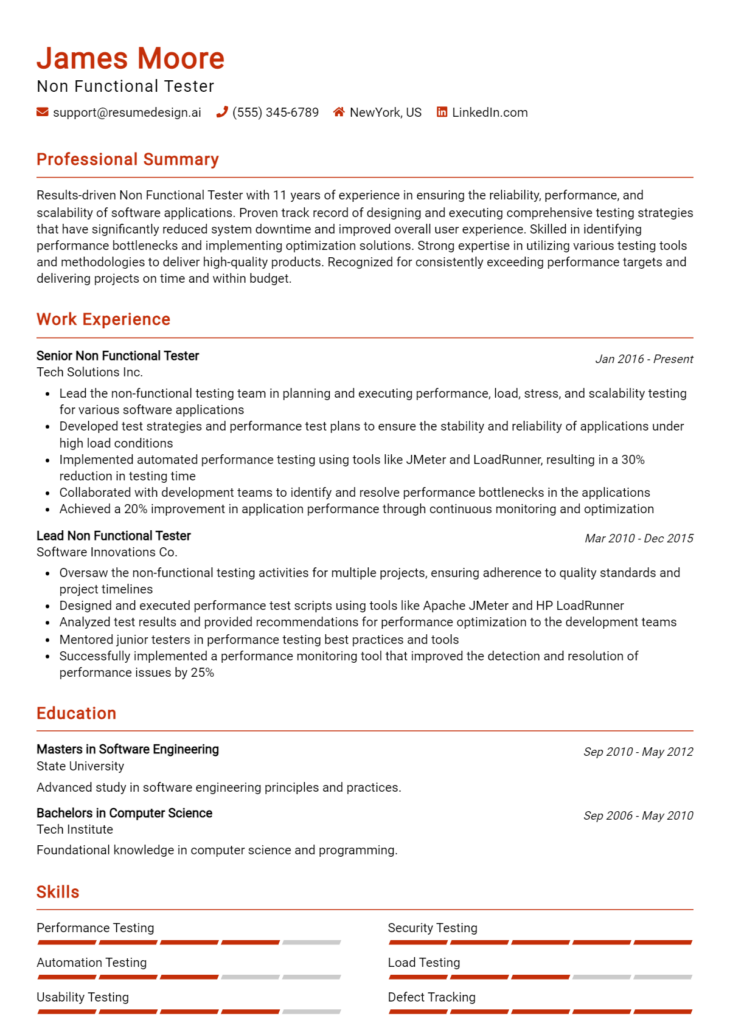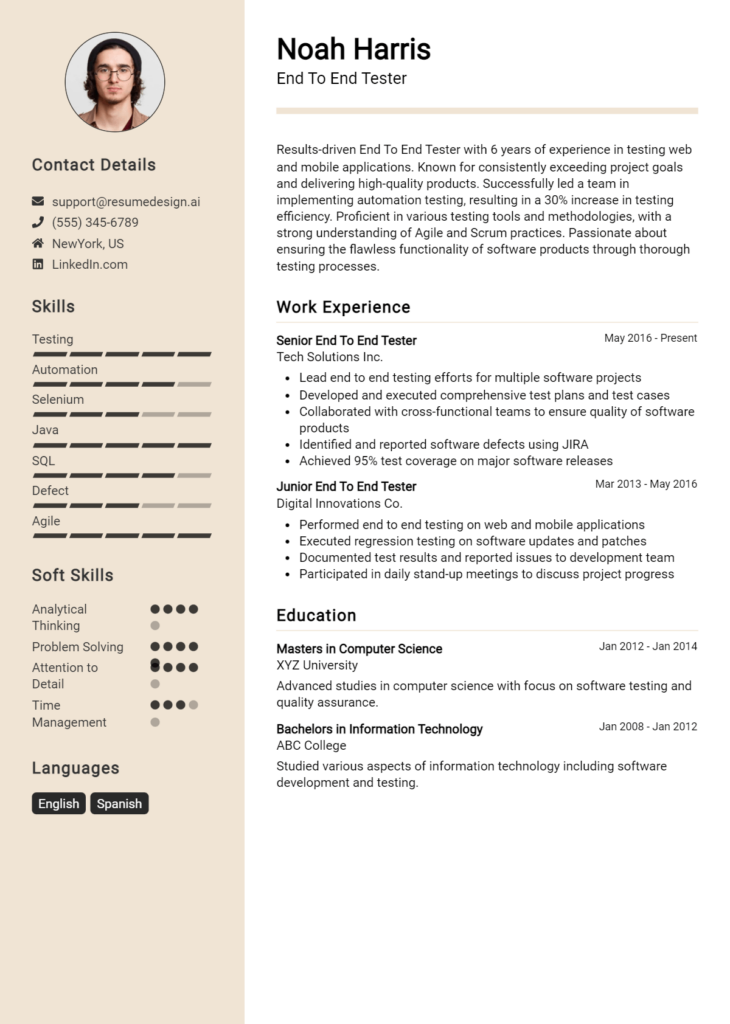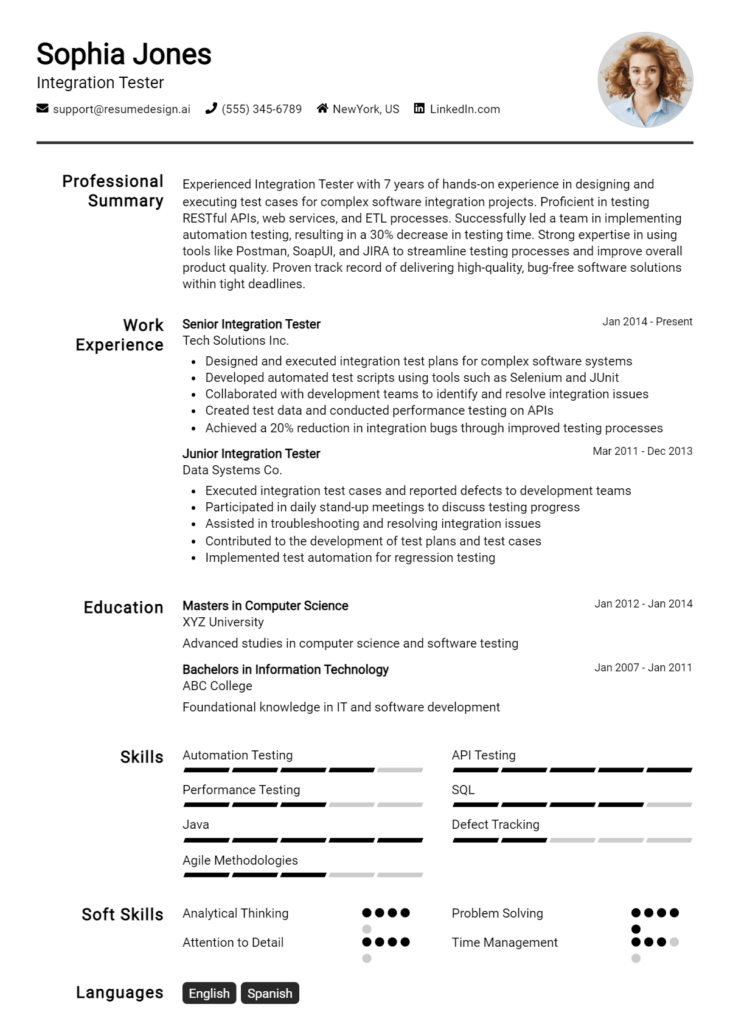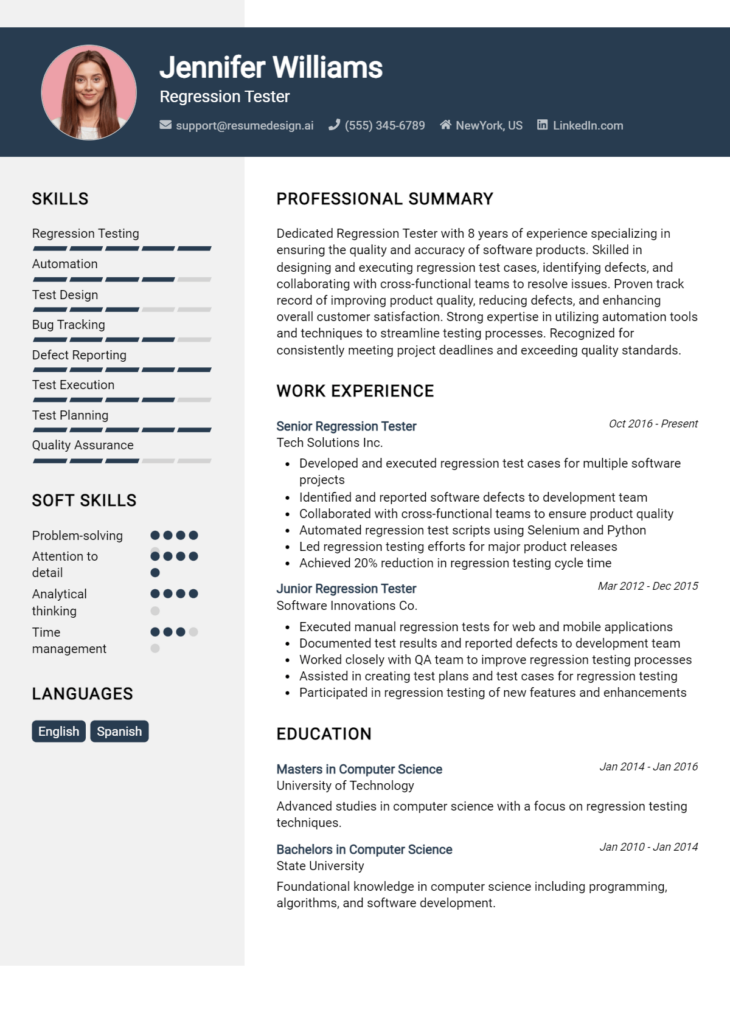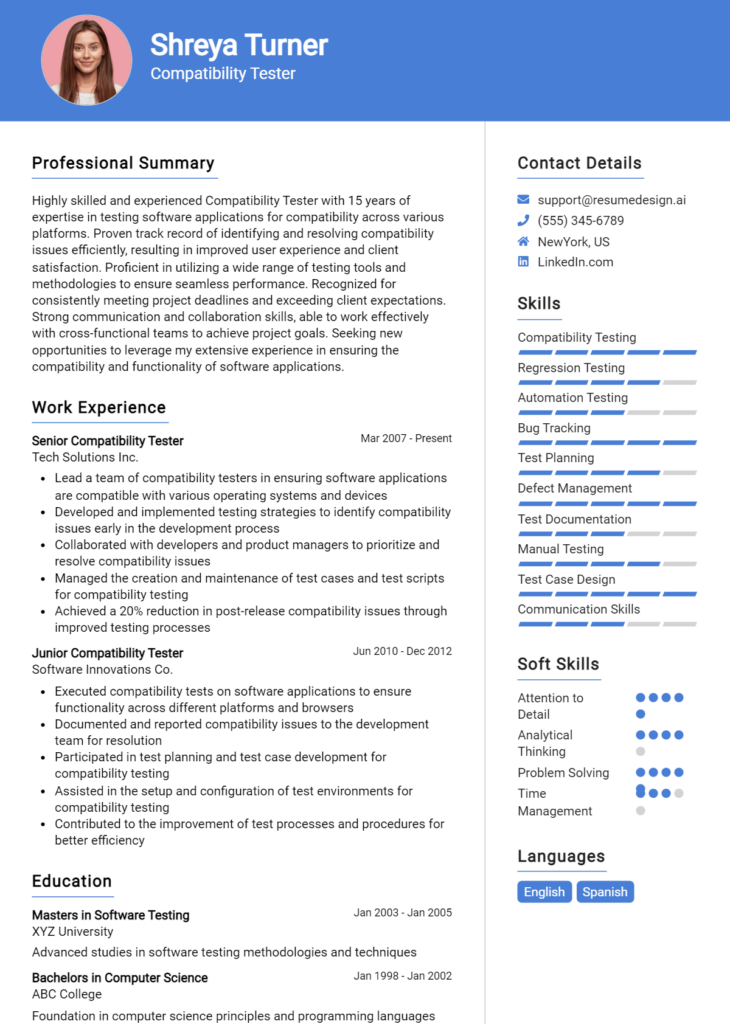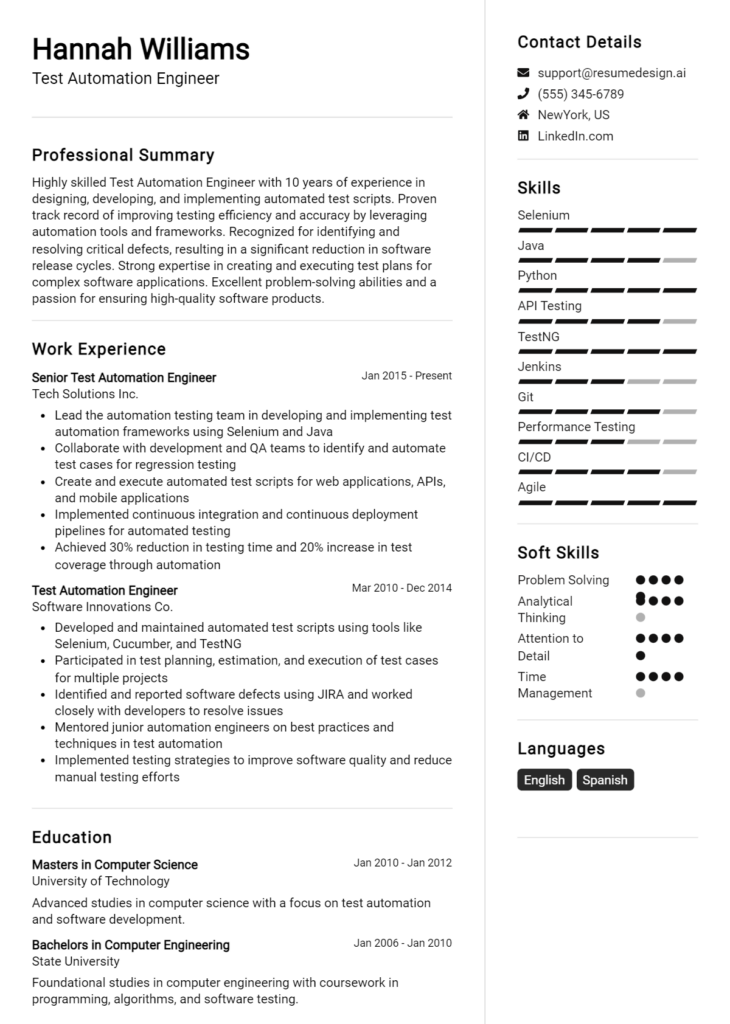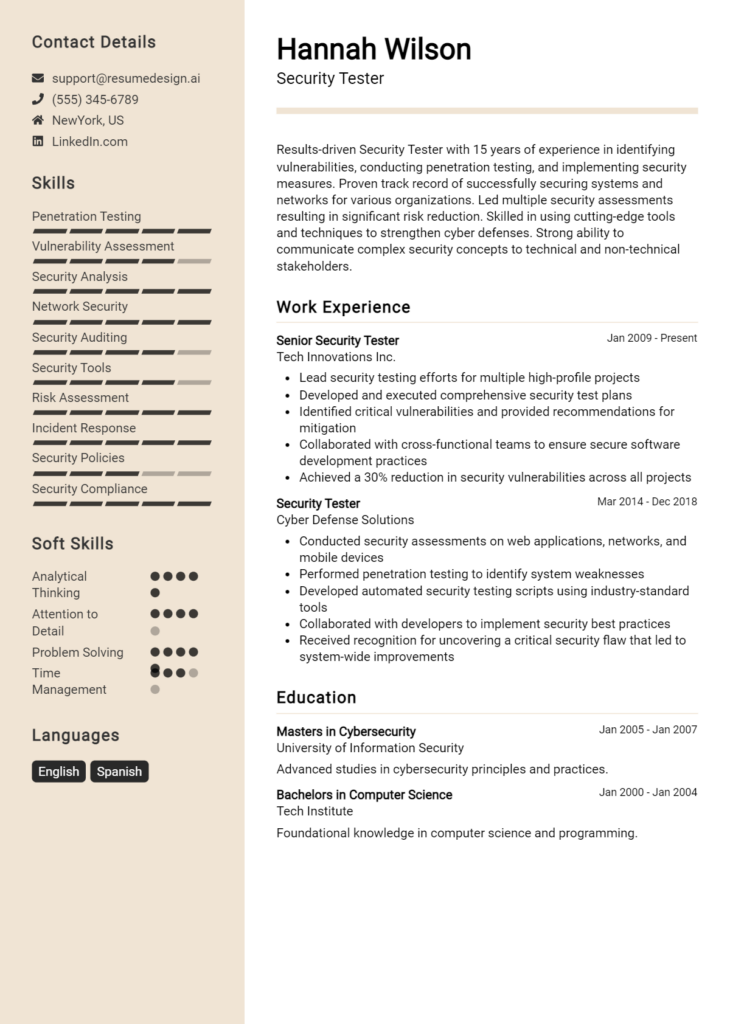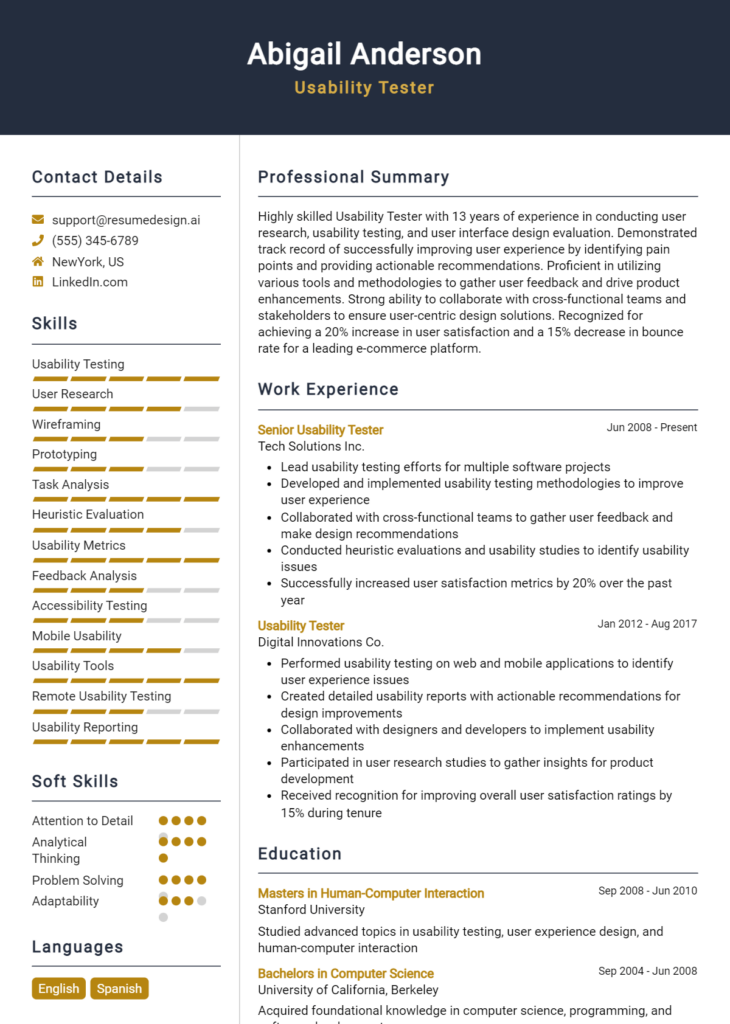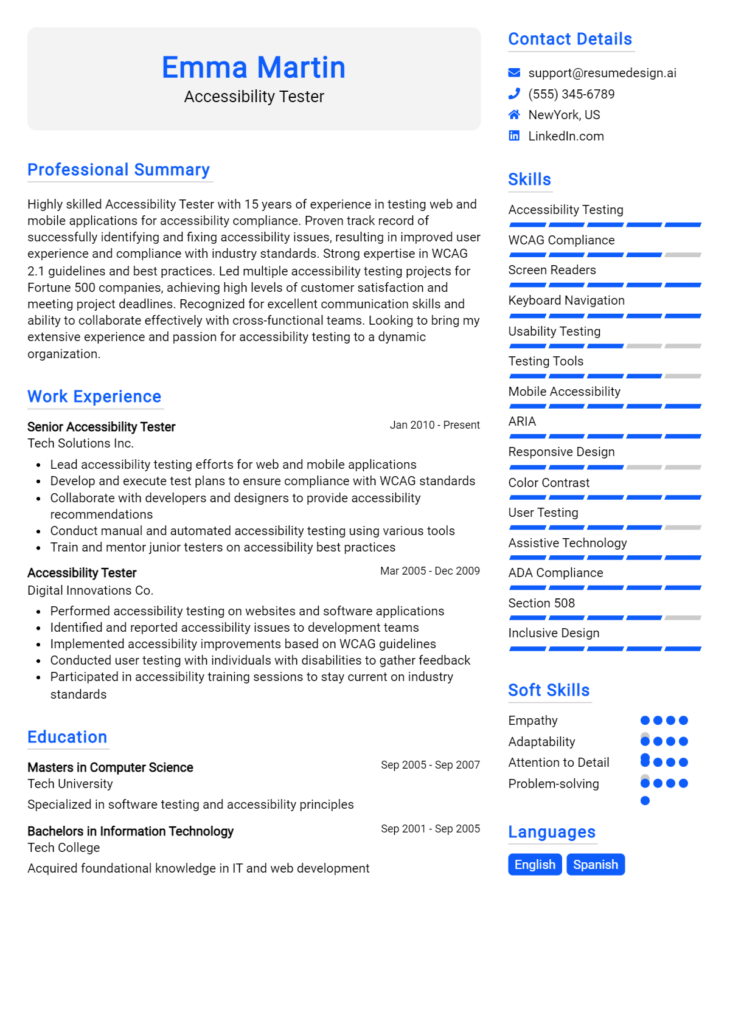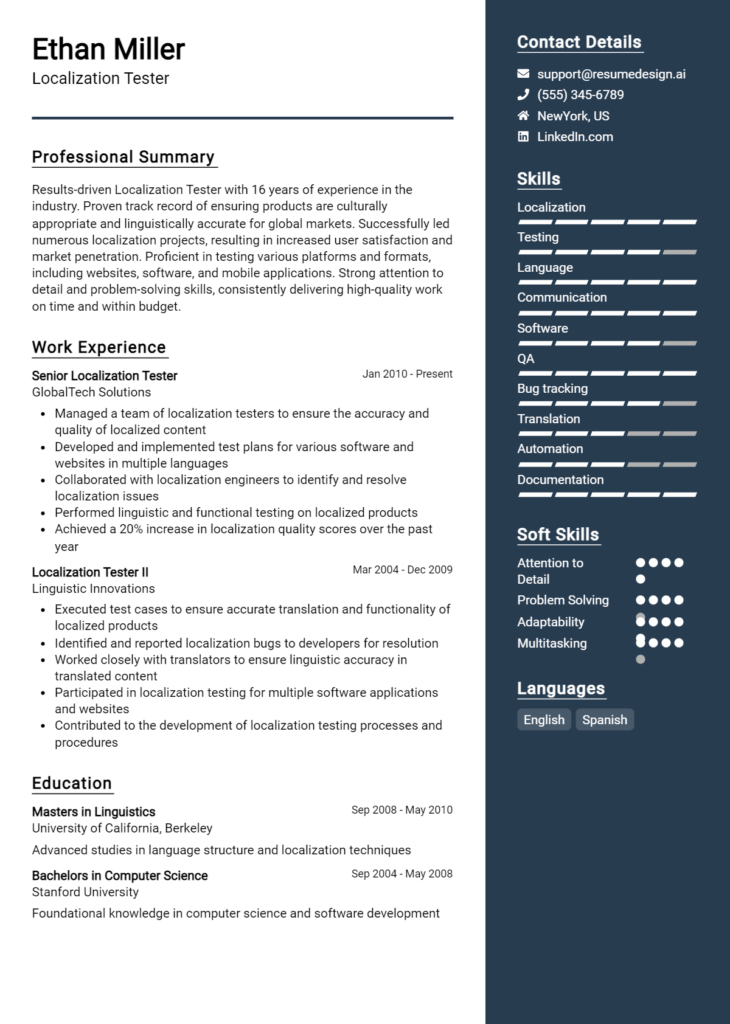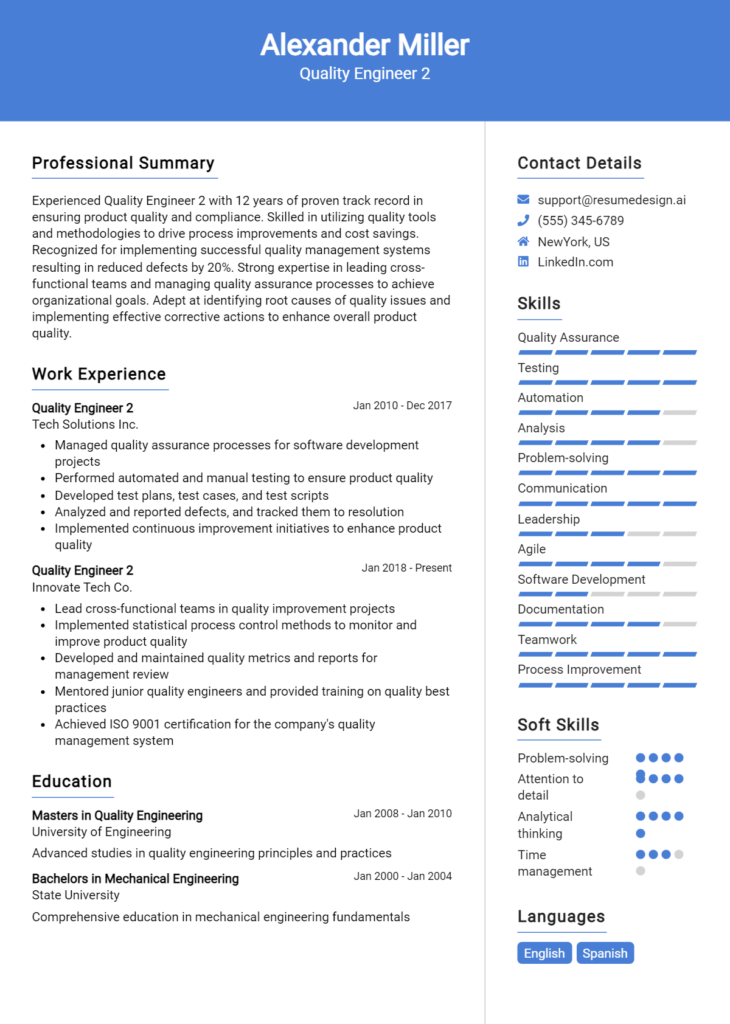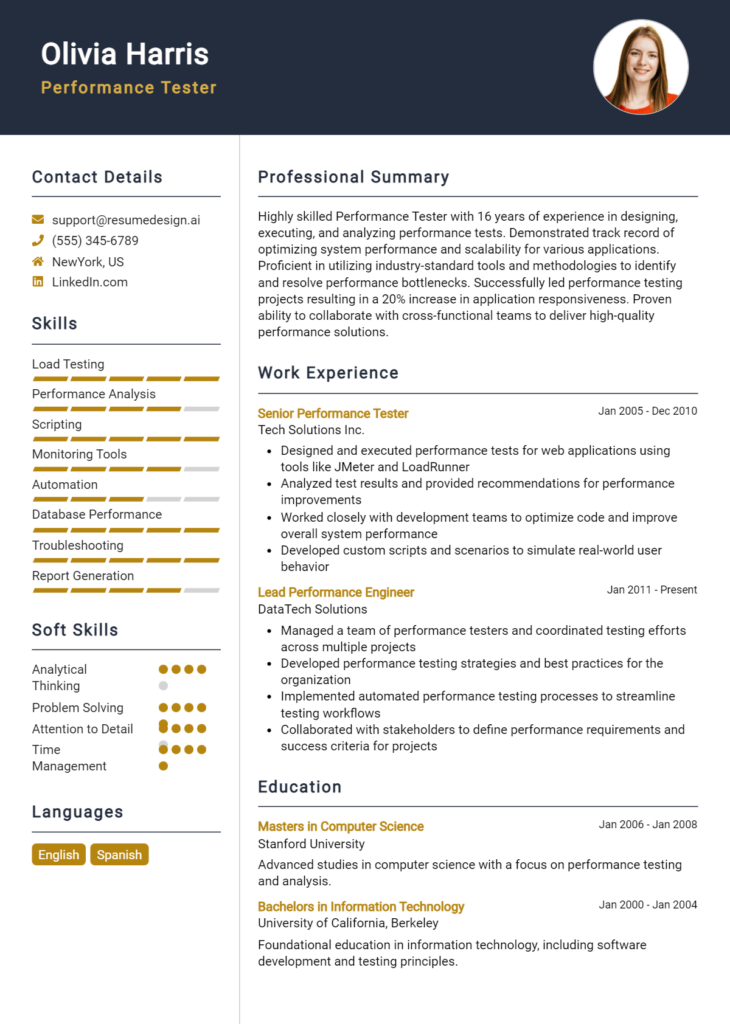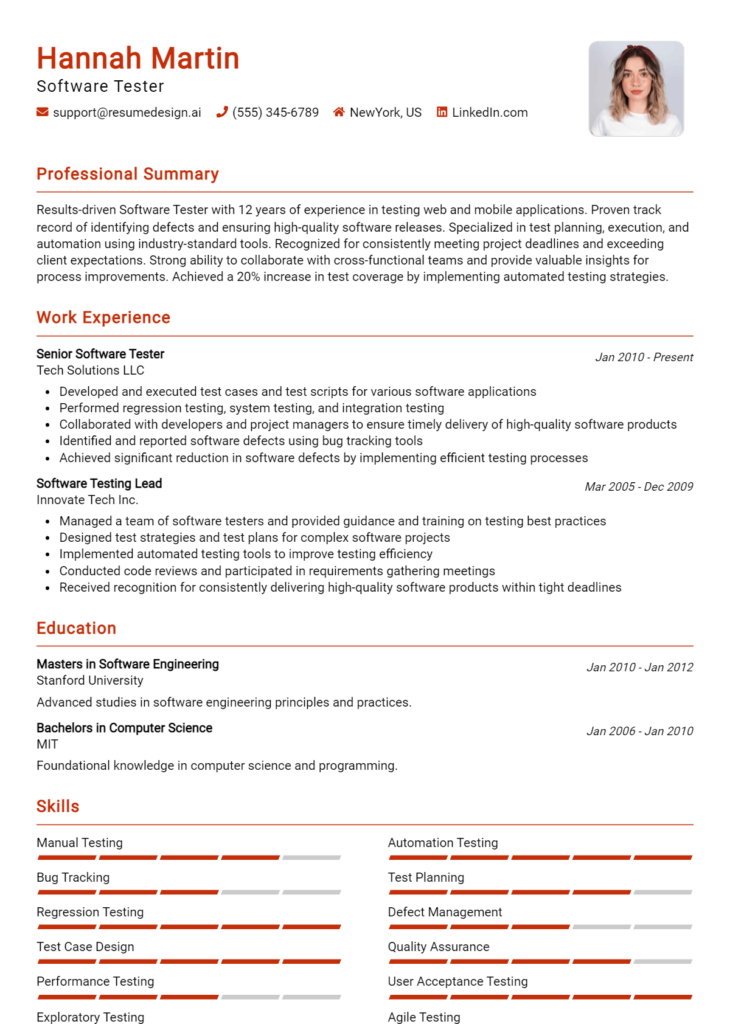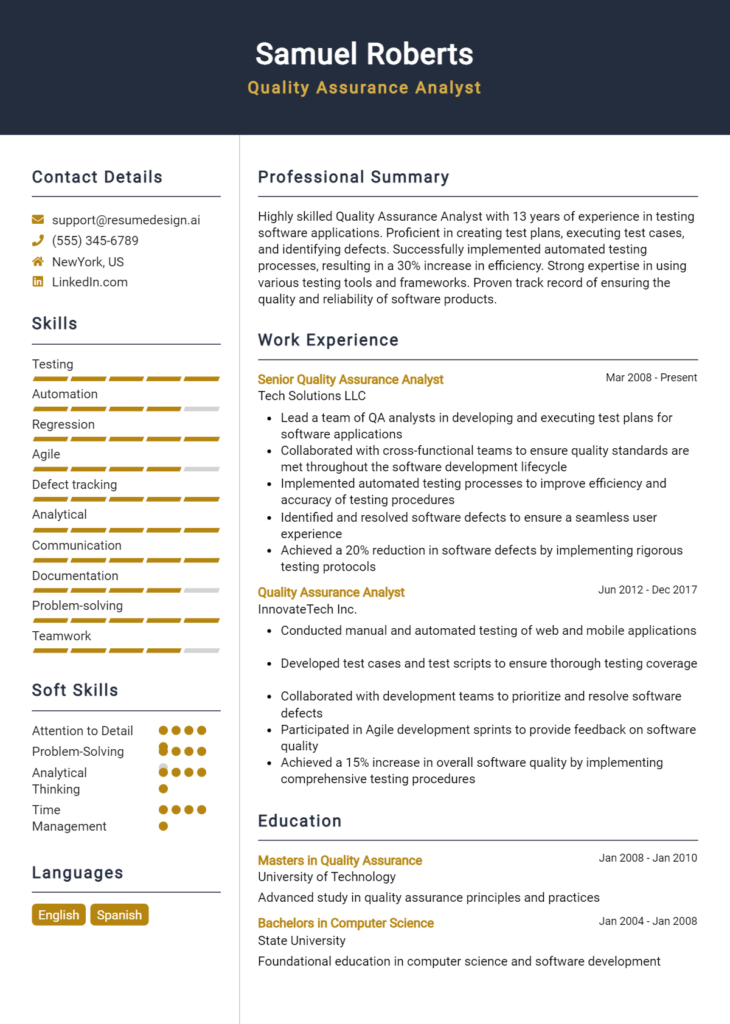Exploratory Tester Core Responsibilities
Exploratory Testers play a crucial role in bridging the gap between development and quality assurance by employing their technical, operational, and problem-solving skills to identify issues in software applications. They conduct unscripted testing to uncover unexpected behaviors, providing invaluable feedback to enhance product quality. Their expertise not only contributes to meeting organizational goals but also fosters collaboration across departments. A well-structured resume that highlights these qualifications is essential for showcasing their unique skill set and experiences effectively.
Common Responsibilities Listed on Exploratory Tester Resume
- Conduct unscripted exploratory testing to identify software defects.
- Collaborate with developers and product managers to understand requirements.
- Create and execute test cases based on exploratory findings.
- Document test results and provide detailed feedback on software performance.
- Participate in risk assessment and impact analysis of software changes.
- Maintain effective communication with cross-functional teams.
- Utilize testing tools and techniques to enhance test efficiency.
- Analyze and report on test coverage and defect trends.
- Continuously improve testing processes and methodologies.
- Provide training and mentorship to junior testers.
- Stay updated with industry trends and advancements in testing practices.
- Contribute to the overall quality strategy of the organization.
High-Level Resume Tips for Exploratory Tester Professionals
In today's competitive job market, a well-crafted resume serves as a crucial tool for Exploratory Tester professionals looking to make their mark. Often the first impression a candidate makes on a potential employer, your resume needs to effectively reflect both your skills and achievements in a way that stands out. It’s not just a list of past jobs; it’s a narrative that highlights your unique expertise in exploratory testing, showcasing your ability to uncover hidden issues and ensure software quality. This guide will provide practical and actionable resume tips specifically tailored for Exploratory Tester professionals, helping you create a document that resonates with hiring managers and sets the stage for your success.
Top Resume Tips for Exploratory Tester Professionals
- Tailor your resume to the specific job description, using keywords and phrases from the listing to align your experience with the employer's needs.
- Highlight relevant experience in exploratory testing, including specific projects where you demonstrated your skills in uncovering defects and ensuring quality.
- Quantify your achievements where possible, such as the percentage of bugs identified or improvements in testing efficiency, to provide concrete evidence of your impact.
- Showcase industry-specific skills such as familiarity with automation tools, bug tracking systems, and test case design methodologies that are relevant to exploratory testing.
- Include a summary or objective statement at the top of your resume that clearly articulates your career goals and key competencies in exploratory testing.
- Utilize bullet points for clarity and brevity, ensuring each point is impactful and easy to read while conveying your accomplishments effectively.
- Incorporate certifications or training related to exploratory testing, software quality assurance, or relevant methodologies like Agile or Scrum.
- Provide links to your professional online presence, such as a LinkedIn profile or a portfolio of testing projects, to give employers a more comprehensive view of your expertise.
- Keep the layout clean and professional, focusing on readability with clear headings and consistent formatting to make a polished impression.
By implementing these tips, you can significantly increase your chances of landing a job in the Exploratory Tester field. A well-structured resume that effectively showcases your skills and achievements will not only capture the attention of hiring managers but also demonstrate your readiness to contribute to their team. Make your resume a powerful tool in your job search and take the next step towards your career in exploratory testing.
Why Resume Headlines & Titles are Important for Exploratory Tester
In the competitive field of software testing, a well-crafted resume headline or title serves as the first impression for hiring managers and recruiters. For an Exploratory Tester, this succinct phrase can immediately capture attention and succinctly summarize the candidate’s core competencies and experiences. A strong headline not only highlights a candidate’s key qualifications but also reflects their understanding of the role they are applying for. It should be concise, relevant, and tailored to the specific job, making it an essential element of a successful resume that stands out in a crowded job market.
Best Practices for Crafting Resume Headlines for Exploratory Tester
- Keep it concise: Aim for a brief, impactful phrase that summarizes your expertise.
- Be role-specific: Tailor your headline to reflect the specific position of Exploratory Tester.
- Highlight key skills: Incorporate critical skills relevant to exploratory testing, such as critical thinking and problem-solving.
- Use action-oriented language: Begin with strong action verbs that convey your capabilities.
- Include relevant certifications: Mention any industry-standard certifications that enhance your qualifications.
- Showcase experience level: Indicate your years of experience or expertise in exploratory testing.
- Make it impactful: Use powerful words that resonate with the job description and company values.
- Avoid jargon: Ensure your headline is easily understandable and free from overly technical terms.
Example Resume Headlines for Exploratory Tester
Strong Resume Headlines
"Results-Driven Exploratory Tester with 5+ Years of Experience in Agile Environments"
“Detail-Oriented Software Tester Specializing in Exploratory Testing and Risk Assessment”
“Certified Exploratory Testing Specialist with Proven Track Record in Enhancing Software Quality”
“Innovative Exploratory Tester Skilled in Identifying Critical Bugs and Improving User Experience”
Weak Resume Headlines
“Tester Looking for a Job”
“Software Testing Professional”
The strong headlines are effective because they clearly communicate the candidate's unique qualifications and experience in exploratory testing, making them memorable and relevant to hiring managers. In contrast, the weak headlines fail to impress due to their vagueness and lack of specificity; they do not convey the candidate's strengths or differentiate them from others in the field, ultimately leading to a missed opportunity for engagement.
Writing an Exceptional Exploratory Tester Resume Summary
A resume summary is a crucial element for an Exploratory Tester, as it serves as the first impression a hiring manager will have of a candidate. A well-crafted summary quickly captures attention by succinctly showcasing key skills, relevant experiences, and notable accomplishments that align with the job role. It should be concise and impactful, tailored to the specific position being applied for, effectively setting the tone for the rest of the resume. By highlighting what makes the candidate uniquely qualified, a strong summary can significantly increase the chances of landing an interview.
Best Practices for Writing a Exploratory Tester Resume Summary
- Quantify achievements to demonstrate impact, such as "reduced testing time by 30%."
- Highlight relevant skills, including tools and methodologies specific to exploratory testing.
- Tailor the summary for each job description to ensure alignment with the employer's needs.
- Use action verbs to convey a sense of proactivity and effectiveness.
- Keep it concise, ideally within 2-4 sentences, to maintain the reader's attention.
- Focus on the most relevant experiences that directly relate to exploratory testing.
- Showcase problem-solving abilities with examples of challenges overcome in past roles.
- Incorporate industry-specific language to resonate with hiring managers.
Example Exploratory Tester Resume Summaries
Strong Resume Summaries
Detail-oriented Exploratory Tester with over 5 years of experience in identifying critical software issues, leading to a 40% reduction in post-release defects. Proficient in utilizing automated testing tools, creating test cases, and collaborating with cross-functional teams to enhance product quality.
Results-driven QA professional with a proven track record of improving testing efficiency by 25% through innovative exploratory testing strategies. Expertise in analyzing user requirements and conducting thorough risk assessments to ensure comprehensive test coverage.
Skilled Exploratory Tester with a passion for delivering high-quality software solutions. Successfully led exploratory testing initiatives that contributed to a 50% increase in user satisfaction ratings. Strong knowledge of Agile methodologies and experience with performance testing tools.
Weak Resume Summaries
Experienced tester looking for a job in software testing. I have worked on various projects and have some technical skills.
Detail-oriented individual with some experience in testing. Seeking a position to utilize my skills and help improve software quality.
The strong resume summaries are considered effective because they provide specific achievements, quantify results, and highlight relevant skills directly related to the role of an Exploratory Tester. They are tailored to demonstrate how the candidate has made a measurable impact in previous positions. In contrast, the weak summaries lack specificity, quantifiable outcomes, and fail to convey a clear understanding of the role, making them less compelling to hiring managers.
Work Experience Section for Exploratory Tester Resume
The work experience section of an Exploratory Tester resume is pivotal in demonstrating a candidate's technical proficiency, leadership capabilities, and commitment to delivering high-quality products. This section not only highlights relevant skills and experiences but also provides tangible evidence of a candidate's ability to manage projects, collaborate with teams, and achieve significant results. By quantifying accomplishments and aligning experiences with industry standards, candidates can present a compelling narrative that sets them apart in a competitive job market.
Best Practices for Exploratory Tester Work Experience
- Highlight relevant technical skills specific to exploratory testing methodologies and tools.
- Quantify achievements with metrics, such as defect reduction rates or time saved through effective testing strategies.
- Showcase experience with collaboration tools and team management to illustrate teamwork and leadership capabilities.
- Include specific examples of successful exploratory testing projects and their impact on product quality.
- Tailor the work experience section to align with the job description and industry trends.
- Use action verbs to convey a proactive approach and demonstrate initiative in previous roles.
- Incorporate feedback from stakeholders to underscore the importance of communication and adaptability.
- Keep descriptions concise while ensuring they reflect the depth of experience and knowledge.
Example Work Experiences for Exploratory Tester
Strong Experiences
- Led a team of 5 testers in a project that resulted in a 30% reduction in critical defects through innovative exploratory testing techniques, enhancing product reliability.
- Implemented a comprehensive exploratory testing framework that improved testing coverage by 40%, resulting in a 25% increase in customer satisfaction scores.
- Collaborated with cross-functional teams to identify and address usability issues, reducing user-reported bugs by 50% in the first release cycle.
- Trained and mentored junior testers in exploratory testing practices, leading to a 60% improvement in testing efficiency across the team.
Weak Experiences
- Performed testing on various projects without specifying the methods or outcomes.
- Worked with a team to identify issues, but did not detail the impact or any quantifiable results.
- Involved in exploratory testing activities but provided no metrics or insights into improvements made.
- Conducted tests on software products without mentioning specific tools or techniques used.
The examples provided illustrate a clear distinction between strong and weak experiences. Strong experiences are characterized by specific, quantifiable outcomes and demonstrate the candidate's technical expertise and leadership in exploratory testing. In contrast, weak experiences lack detail and measurable results, failing to convey the candidate's impact or depth of involvement in their roles. By focusing on tangible achievements and relevant skills, candidates can significantly enhance the effectiveness of their work experience section.
Education and Certifications Section for Exploratory Tester Resume
The education and certifications section of an Exploratory Tester resume is crucial as it provides potential employers with insight into a candidate's academic background and professional qualifications. This section not only showcases the formal education attained, such as degrees in computer science or software engineering, but also highlights industry-relevant certifications that demonstrate the candidate's commitment to continuous learning and adherence to industry standards. Including pertinent coursework and specialized training reinforces the candidate's expertise and strengthens their credibility, aligning their qualifications with the specific demands of the exploratory testing role.
Best Practices for Exploratory Tester Education and Certifications
- Focus on relevant degrees, such as Computer Science, Information Technology, or Software Engineering.
- Highlight industry-recognized certifications, like ISTQB or Certified Agile Tester.
- Include any specialized training in testing methodologies or tools that are widely used in exploratory testing.
- List relevant coursework that demonstrates knowledge of software development life cycles and testing strategies.
- Be specific about the level of education attained, including the name of the institution and graduation dates.
- Consider mentioning ongoing education efforts, such as webinars, workshops, or online courses to show commitment to professional development.
- Avoid including irrelevant or outdated certifications that do not pertain to exploratory testing or software quality assurance.
- Use clear formatting to enhance readability and ensure that this section stands out in the resume.
Example Education and Certifications for Exploratory Tester
Strong Examples
- Bachelor of Science in Computer Science, ABC University, Graduated May 2022
- ISTQB Certified Tester Foundation Level, Obtained March 2023
- Agile Testing Certification, Scrum Alliance, Completed June 2023
- Coursework in Software Testing Techniques and Quality Assurance Practices, XYZ Institute
Weak Examples
- High School Diploma, ABC High School, Graduated 2010
- Old Microsoft Certified Professional (MCP), Obtained 2005
- Certification in Windows 98 Troubleshooting, Completed 2000
- Course in Basic Computer Skills, Completed 2015
The strong examples listed above are considered effective because they demonstrate relevant educational qualifications and certifications that align with the exploratory tester role, showcasing both recent accomplishments and specialized knowledge. In contrast, the weak examples lack relevance to the current industry needs, are outdated, or do not contribute meaningfully to the candidate's suitability for the exploratory testing position, thereby diminishing the overall impact of the resume.
Top Skills & Keywords for Exploratory Tester Resume
In the rapidly evolving field of software testing, the role of an Exploratory Tester is crucial for ensuring that applications meet user expectations and function seamlessly. A well-crafted resume that highlights pertinent skills can significantly enhance an applicant's chances of landing an interview. Skills not only reflect a candidate's technical abilities but also their problem-solving capabilities, adaptability, and communication strengths. In this competitive job market, showcasing both hard and soft skills effectively can help set a candidate apart from the crowd, making it essential for Exploratory Testers to curate their resumes with the right keywords.
Top Hard & Soft Skills for Exploratory Tester
Soft Skills
- Analytical Thinking
- Problem Solving
- Attention to Detail
- Communication Skills
- Collaboration and Teamwork
- Flexibility and Adaptability
- Time Management
- Creativity
- Critical Thinking
- User-Centric Mindset
Hard Skills
- Knowledge of Testing Methodologies
- Experience with Test Automation Tools
- Familiarity with Bug Tracking Software
- Proficiency in SQL and Databases
- Understanding of Software Development Life Cycle (SDLC)
- Basic Programming Skills (e.g., Python, Java)
- API Testing and Tools (e.g., Postman)
- Performance Testing Tools (e.g., JMeter)
- Knowledge of Agile and Scrum Methodologies
- Experience with Continuous Integration/Continuous Deployment (CI/CD)
By incorporating these essential skills into your resume, along with relevant work experience, you can present a comprehensive picture of your qualifications as an Exploratory Tester, making a compelling case for your candidacy.
Stand Out with a Winning Exploratory Tester Cover Letter
I am excited to apply for the Exploratory Tester position at [Company Name], as advertised on your careers page. With a strong background in software testing and a passion for uncovering hidden issues, I believe I can contribute significantly to your team. My experience includes working with cross-functional teams to enhance product quality through innovative testing techniques and thorough exploratory testing methodologies. I am particularly drawn to [Company Name]'s commitment to delivering exceptional user experiences, and I am eager to bring my skills in critical thinking and problem-solving to help achieve that goal.
In my previous role at [Previous Company Name], I successfully identified and documented critical bugs that traditional testing methods overlooked. By utilizing various exploratory testing techniques, such as session-based testing and risk-based testing, I was able to improve the overall product quality and user satisfaction significantly. My ability to think creatively and approach testing from different angles has not only strengthened my testing skills but has also fostered collaboration among team members, leading to more efficient project outcomes.
I also understand the importance of effective communication in the testing process. I take pride in my ability to articulate complex issues clearly and provide actionable feedback to developers and stakeholders. This ensures that everyone involved is aligned and can work together to resolve any concerns swiftly. I am enthusiastic about the opportunity to leverage my testing expertise at [Company Name], where I can contribute to your mission of delivering top-notch products.
Thank you for considering my application. I look forward to the possibility of discussing how my experience and skills can align with the needs of your team. I am excited about the opportunity to bring my passion for exploratory testing to [Company Name] and contribute to the continuous improvement of your software products.
Common Mistakes to Avoid in a Exploratory Tester Resume
When crafting a resume for an exploratory tester position, it's crucial to present your skills and experiences clearly and effectively. However, many candidates make common mistakes that can diminish their chances of landing an interview. Avoiding these pitfalls will help showcase your qualifications and demonstrate your understanding of the exploratory testing domain.
Lack of Specificity: Vague descriptions of past roles can leave hiring managers confused. Instead, clearly outline specific tasks and achievements that highlight your exploratory testing skills.
Ignoring Relevant Skills: Failing to include key skills such as critical thinking, problem-solving, and creativity can hinder your resume. Make sure to emphasize skills that are particularly relevant to exploratory testing.
Overemphasis on Automation: While automation is important, exploratory testing relies heavily on manual testing skills. Avoid placing too much focus on automated testing tools without addressing your manual testing capabilities.
Neglecting Soft Skills: Exploratory testing often requires strong communication and collaboration abilities. Don't overlook the importance of soft skills; include examples of teamwork and communication in your experiences.
Using a Generic Template: Submitting a one-size-fits-all resume can make you appear less invested. Customize your resume to reflect the specific job requirements and company culture for each application.
Not Showcasing Continuous Learning: The tech industry evolves rapidly, and not mentioning your commitment to continuous learning, such as attending workshops or obtaining certifications, can make you seem stagnant.
Forgetting to Include Metrics: Failing to quantify achievements can weaken your impact. Whenever possible, include metrics that demonstrate the effectiveness of your testing efforts, such as bug detection rates or improvements in product quality.
Typos and Formatting Issues: Simple errors can tarnish your professionalism. Proofread your resume thoroughly and ensure consistent formatting to make a polished impression.
Conclusion
As an Exploratory Tester, your role is crucial in ensuring the quality and functionality of software applications. This article has covered several key aspects of what it means to be an effective Exploratory Tester, including the importance of critical thinking, adaptability, and creativity in testing methodologies. We highlighted the need for strong communication skills to collaborate with development teams and other stakeholders effectively. Additionally, we discussed the value of documenting findings and insights during the testing process to enhance future testing efforts and improve overall software quality.
Now is the perfect time to review and refine your Exploratory Tester resume to make sure it reflects your skills and experiences accurately. A well-crafted resume can set you apart in the competitive job market and showcase your unique qualifications.
To assist you in this process, consider utilizing the following resources:
- Explore a variety of resume templates that can help you design a professional-looking resume.
- Use a resume builder to create a customized resume that highlights your strengths and expertise.
- Check out resume examples for inspiration and insights on how to structure your own.
- Don’t forget to craft an impressive cover letter using our cover letter templates to complement your resume.
Take action today—review your resume and ensure it aligns with your career goals as an Exploratory Tester!

